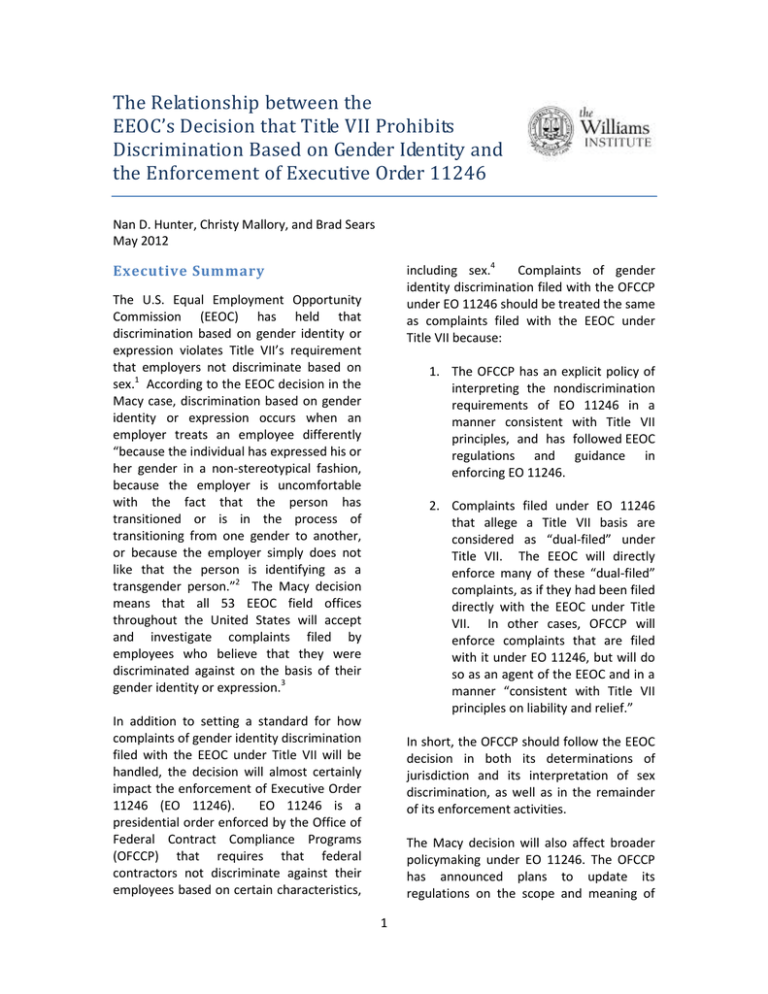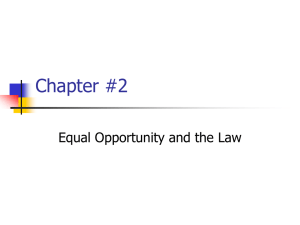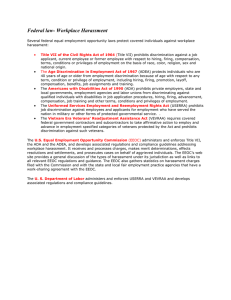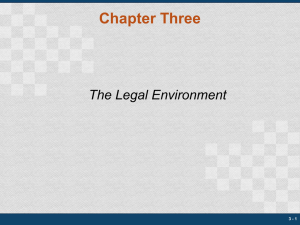The Relationship between the EEOC’s Decision that Title VII Prohibits
advertisement

The Relationship between the EEOC’s Decision that Title VII Prohibits Discrimination Based on Gender Identity and the Enforcement of Executive Order 11246 Nan D. Hunter, Christy Mallory, and Brad Sears May 2012 Executive Summary including sex.4 Complaints of gender identity discrimination filed with the OFCCP under EO 11246 should be treated the same as complaints filed with the EEOC under Title VII because: The U.S. Equal Employment Opportunity Commission (EEOC) has held that discrimination based on gender identity or expression violates Title VII’s requirement that employers not discriminate based on sex.1 According to the EEOC decision in the Macy case, discrimination based on gender identity or expression occurs when an employer treats an employee differently “because the individual has expressed his or her gender in a non-stereotypical fashion, because the employer is uncomfortable with the fact that the person has transitioned or is in the process of transitioning from one gender to another, or because the employer simply does not like that the person is identifying as a transgender person.”2 The Macy decision means that all 53 EEOC field offices throughout the United States will accept and investigate complaints filed by employees who believe that they were discriminated against on the basis of their gender identity or expression.3 1. The OFCCP has an explicit policy of interpreting the nondiscrimination requirements of EO 11246 in a manner consistent with Title VII principles, and has followed EEOC regulations and guidance in enforcing EO 11246. 2. Complaints filed under EO 11246 that allege a Title VII basis are considered as “dual-filed” under Title VII. The EEOC will directly enforce many of these “dual-filed” complaints, as if they had been filed directly with the EEOC under Title VII. In other cases, OFCCP will enforce complaints that are filed with it under EO 11246, but will do so as an agent of the EEOC and in a manner “consistent with Title VII principles on liability and relief.” In addition to setting a standard for how complaints of gender identity discrimination filed with the EEOC under Title VII will be handled, the decision will almost certainly impact the enforcement of Executive Order 11246 (EO 11246). EO 11246 is a presidential order enforced by the Office of Federal Contract Compliance Programs (OFCCP) that requires that federal contractors not discriminate against their employees based on certain characteristics, In short, the OFCCP should follow the EEOC decision in both its determinations of jurisdiction and its interpretation of sex discrimination, as well as in the remainder of its enforcement activities. The Macy decision will also affect broader policymaking under EO 11246. The OFCCP has announced plans to update its regulations on the scope and meaning of 1 sex discrimination in order “to reflect the current state of the law in this area.” OFCCP planned to update its regulations by April 2012.5 coordinate enforcement efforts under Title VII and EO 11246 so as to “maximize effort, promote efficiency, and eliminate conflict, competition, duplication, and inconsistency among the operations, functions and jurisdictions” of the agencies.13 For example, under the MOU, last updated in 2011, the OFCCP agreed to treat discrimination based on an employee’s accent as national origin discrimination in order to conform with EEOC policy.14 The OFCCP Has an Explicit Policy of Interpreting the NonDiscrimination Requirements of EO 11246 in a Manner Consistent with Title VII Principles, and Has Followed EEOC Regulations and Guidance in Enforcing EO 11246 There is little question that establishing a uniform procedure for accepting and enforcing gender identity discrimination complaints under Title VII and EO 11246 would “further the agencies’ joint objectives in ensuring equal employment opportunities for applicants and employees under Title VII of the Civil Rights Act of 1964 and Executive Order 11246.”15 Given the Manual, the administrative case law and the MOU, a failure to do so arguably violates OFCCP’s obligations to enforce the law. The OFCCP publishes its guidance for enforcing EO 11246 in its Federal Contract Compliance Manual (the Manual).6 The chapter of the Manual that “focuses on how to determine whether the facts of a case show employment discrimination”7 states that “[i]t is OFCCP’s policy to interpret the non-discrimination requirements of Executive Order 11246, as amended, in a manner consistent with Title VII principles.”8 For example, the Manual further states that OFCCP “follows Title VII principles when determining whether sexual harassment has occurred,”9 and that its “longstanding policy is to follow Title VII principles when conducting analyses of potential discrimination under Executive Order 11246.”10 Complaints Filed under EO 11246 that Allege a Title VII Basis are Considered as “DualFiled” Under Title VII with the EEOC. These Complaints Will Be Handled by the EEOC or the OFCCP, Acting as the EEOC’s Agent, as if They Were Initially Filed under Title VII Consistent with the Manual’s direction, administrative law judges (ALJs) and the Administrative Review Board have followed courts’ interpretations of Title VII when deciding cases brought under EO 11246.11 In practice, ALJs and the Administrative Review Board commonly follow Title VII case law when deciding EO 11246 cases; in fact, we have been unable to locate a single case where they declined to follow courts’ Title VII precedent.12 All complaints of employment discrimination filed with OFCCP under EO 11246 that allege a Title VII basis, including sex discrimination, are considered to be dual-filed under Title VII with the EEOC.16 In general, OFCCP refers individual complaints to the EEOC,17 where they are handled the same as complaints initially filed with EEOC under Title VII.18 The OFCCP retains complaints alleging a pattern or practice of discrimination, and complaints filed by a class of employees. The OFCCP acts as the Also consistent with the Manual, the OFCCP and the EEOC have agreed in a Memorandum of Understanding (MOU) to 2 EEOC’s agent for the purpose of resolving the Title VII component of these cases, and does so in a manner “consistent with Title VII principles on liability and relief.”19 One venue for working out new policy positions may be the biannual meetings of the EEOC’s and the OFCCP’s District Directors and Regional Attorneys.23 These meetings are intended to facilitate coordinated enforcement and allow staff of the two agencies to “work to increase efficiency, and eliminate competition and duplication, and… engage in consultation regarding any topic that enhances the agencies’ mutual enforcement interests.”24 In either of these situations, the OFCCP would have to initially determine jurisdiction, i.e., whether the complaint alleged a claim under Title VII. In order to ensure that claims of gender identity discrimination under EO 11246 are treated the same by both agencies – whether enforced by the EEOC or by the OFCCP acting as the EEOC’s agent - OFCCP will be compelled to follow the determination articulated by the EEOC in the Macy decision. Conclusion It is the OFCCP’s policy and practice to interpret EO 11246’s non-discrimination requirements to be the same as Title VII’s requirements. This policy and practice indicates that the OFCCP will likely treat complaints of gender identity discrimination filed under EO 11246 as actionable complaints of sex discrimination, consistent with the EEOC’s recent Title VII decision. For OFCCP to do otherwise would be inconsistent with its Compliance Manual, its Memorandum of Understanding with EEOC, its internal Departmental precedent in ALJ and Administrative Review Board decisions, and the necessity of parallel interpretation built into the dual filing processes for complaints alleging a cause of action under Title VII. The OFCCP Will Soon Need to Address the Impact of the EEOC Decision on How it Handles Sex Discrimination Complaints Filed under EO 11246 The OFCCP has given notice that it will develop new regulations regarding sex discrimination “to reflect the current state of the law in this area,”20 having noted that the current guidance on sex discrimination is 30 years old.21 The OFCCP planned to issue new rules in April 2012.22 It is almost certain that the new regulations will have to address the holding in the Macy decision, although some of the more detailed issues could be dealt with in subregulatory guidance. OFCCP will also need to address the impact of the EEOC decision in its forthcoming rulemaking pertaining to sex discrimination under EO 11246 and during future staff conferences with the EEOC. 3 Endnotes 1 Mia Macy, Appeal No. 0120120821 (EEOC Apr. 20, 2012). Id. slip op. at 7-8. 3 Jeff Krehely & Crosby Burns, A Watershed Moment for Workplace Equality: Equal Employment Opportunity Commission Ruling Protects Transgender Workers (Apr. 4, 2012), http://www.americanprogress.org/issues/2012/04/eeoc_decision.html. 4 Exec. Order. No. 11,246, § 202, 3 C.F.R. 339 (1964-1965). Available, as amended, at http://www.presidency.ucsb.edu/ws/index.php?pid=59153. 5 Office of Federal Contract Compliance, United States Dep’t of Labor, Sex Discrimination Guidelines, RIN 1250-AA05 (2011), http://www.dol.gov/ofccp/regs/unifiedagenda/Fall-2011/1250-AA05.htm. 6 Office of Federal Contract Compliance Programs, Federal Contract Compliance Manual, available at http://www.dol.gov/ofccp/regs/compliance/fccm/fccmanul.htm (last visited Apr. 27, 2012) [hereinafter FCCM]. 7 FCCM at 7A01. 8 FCCM at 7A06. 9 FCCM at 3G01(h)(4). 10 Proposed Rules: Interpretive Standards for Systemic Compensation Discrimination and Voluntary Guidelines for Self-Evaluation of Compensation Practices Under Executive Order 11246; Notice of Proposed Rescission, 75 Fed. Reg. 62-01 (Jan. 3, 2011). The OFCCP has also decided to follow Title VII case law “in determining whether a successor employer is liable for the discriminatory acts of its predecessor” and “in construing what constitutes make whole relief.” FCCM at 7F14, 7F03. 11 Several ALJ decisions have enunciated a standard for applying Title VII case law to EO 12246 cases. One decision simply says that Title VII analysis is used to determine if there has been a violation of EO 11246. Greenwood Milles, Inc., Case No. 1989-OFC-0039, 2000 WL 34601379 (U.S. Dep’t of Labor Feb. 24, 2000 (“Violations of Executive Order 11246 are analyzed using the same standards as Title VII of the Civil Rights Act of 1964.”) Two other decisions say that Title VII cases are not binding, but they do provide “guidance.” TNT Crust, Case No. 04-OFC-3, 2007 WL 5309232, at *14 (U.S. Dep’t of Labor Sept. 10, 2007) (“Cases interpreting Title VII, while not necessarily binding authority for administrative proceedings under the Executive Order [11246], do supply guidance in analyzing allegations brought by the government.”); Harris Trust & Sav. Bank, Case No. 78-OFCCP-2, 1986 OFCCP LEXIS 17, at *7 (U.S. Dep’t of Labor Dec. 22, 1986) (“While not necessarily binding upon administrative tribunals in enforcement proceedings under the Order [11246], cases interpreting Title VII… do provide guidance in examining alleged violations.”). 12 Examples of ALJs and the Administrative Review Board relying on Title VII case law include: Frito-Lays, Inc., Case No. 10-OFC-0002, 2010 WL 3211718 (U.S. Dep’t of Labor July 23, 2010) (relying on case law that determined the scope of the EEOC’s power to investigate under Title VII to determine the OFCCP’s power to investigate under EO 11246); U.S. Airways, Inc., Case No. 1988-OFC-17, 2002 WL 32984073 (U.S. Dep’t of Labor Feb. 14, 2002) (using case law developed under Title VII and other labor and employment statutes to find that defendant could properly reject a proposed consent decree in a proceeding brought EO 11246 because it would alter the terms of its collective bargaining agreement); Volvo GM Heavy Truck Corp., Case No. 96-OFC-2, 1998 WL 34373222 (U.S. Dep’t of Labor Apr. 27, 1998) (citing Title VII cases to support the proposition that “discovery rules, particularly with respect to employment discrimination cases, are to be construed liberally in favor of the party seeking discovery.”); Cleveland Clinic Foundation, Case No. 91-OFC-20, 1996 WL 33170033 (U.S. Dep’t of Labor July 17, 1996) (applying case law developed under the anti-retaliation provision in Title VII to analyze the anti-relation provision contained in the regulations implementing EO 11246); Cambridge Wire, Case No. 94-OFC-12, 1995 WL 17222640 (U.S. Dep’t of Labor Dec. 18, 1995) (using Title VII case law to evaluate the legality of a consent decree entered into under EO 11246); Burlington Indust., Case No. 90-OFC-10, 1991 OFCCP LEXIS 59 (Dep’t of Labor Nov. 1, 1991) (applying McDonnell Douglas and other Title VII case law to allocate burdens of proof in a disparate treatment case brought under EO 11246). 2 4 13 Equal Employment Opportunity Commission & Office of Federal Contract Compliance, Memorandum of Understanding Between the U.S. Department of Labor and the Equal Employment Opportunity Commission (Nov. 7, 2011), available at http://www.eeoc.gov/laws/mous/eeoc_ofccp.cfm. 14 FCCM at 7E10. 15 Equal Employment Opportunity Commission, Notice: Coordination of Functions; Memorandum of Understanding (Nov. 9, 2011), available at http://www.eeoc.gov/laws/mous/eeoc_ofccp.cfm. 16 Equal Employment Opportunity Commission & Office of Federal Contract Compliance, Memorandum of Understanding Between the U.S. Department of Labor and the Equal Employment Opportunity Commission (Nov. 7, 2011), available at http://www.eeoc.gov/laws/mous/eeoc_ofccp.cfm. 17 Id. 18 Id. 19 Equal Employment Opportunity Commission & Office of Federal Contract Compliance, Memorandum of Understanding Between the U.S. Department of Labor and the Equal Employment Opportunity Commission (Nov. 7, 2011), available at http://www.eeoc.gov/laws/mous/eeoc_ofccp.cfm. 20 Office of Federal Contract Compliance, United States Dep’t of Labor, Sex Discrimination Guidelines, RIN 1250-AA05 (2011), http://www.dol.gov/ofccp/regs/unifiedagenda/Fall-2011/1250-AA05.htm. 21 Id. 22 Id. 23 Equal Employment Opportunity Commission & Office of Federal Contract Compliance, Memorandum of Understanding Between the U.S. Department of Labor and the Equal Employment Opportunity Commission (Nov. 7, 2011), available at http://www.eeoc.gov/laws/mous/eeoc_ofccp.cfm. 24 Id. 5


